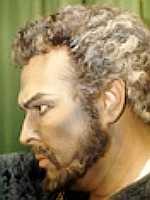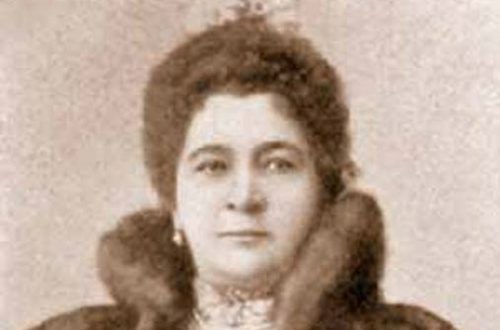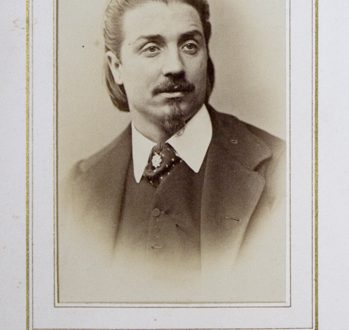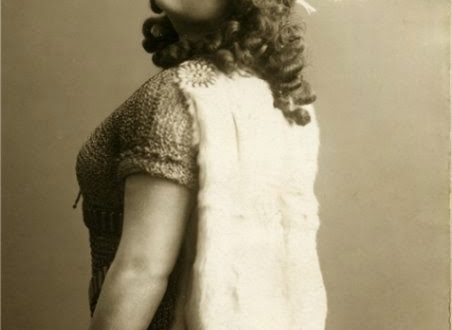
Vladimir Andreevich Atlantov |
Vladimir Atlantov
During the years of performances, Atlantov was named among the leading tenors of the world, among these chosen ones – along with Placido Domingo, Luciano Pavarotti, Jose Carreras.
“I have never met a dramatic tenor of such beauty, expressiveness, power, expression” – this is how G.V. Sviridov.
Opinion of M. Nest’eva: “… Atlantov’s dramatic tenor is like a precious stone – so it shimmers in the luxury of shades; powerful, large, it is both flexible and resilient, velvety and easily “flying”, nobly restrained, it can be rebelliously red-hot and gently dissolve in silence. Filled with masculine beauty and aristocratic dignity, the notes of its central register, the strong lower section of the range, saturated with hidden dramatic power, the super-sensitive, quiveringly vibrating brilliant tops are immediately recognizable and have a huge impact force. Possessing a perfectly rich overtones, a truly belcant sound, the singer, however, never tends to prettiness, does not use it “for the sake of effect”. One has only to feel captivated by the sensual impact of his voice, as the high artistic culture of the artist immediately makes itself felt and the listener’s perception is carefully directed towards comprehending the secrets of the image, empathizing with what is happening on the stage.
Vladimir Andreevich Atlantov was born on February 19, 1939 in Leningrad. Here is how he talks about his journey into art. “I was born into a family of singers. As a child, he entered the world of theater and music. My mother played leading roles at the Kirov Theatre, and then was the main vocal consultant at the same theater. She told me about her career, how she sang with Chaliapin, Alchevsky, Ershov, Nelepp. From early childhood, I spent all my days in the theater, backstage, in the props – I played with sabers, daggers, chain mail. My life was predetermined…”
At the age of six, the boy entered the Leningrad Choir School named after M.I. Glinka, where solo singing was then taught, is the rarest early education for a singer. He sang in the Leningrad Choir Chapel, here he mastered playing the piano, violin, cello, and at the age of 17 he already received a diploma as a choir conductor. Then – years of study at the Leningrad Conservatory. Everything went smoothly at first, but…
“My academic life was not easy,” Atlantov continues, recalling those already distant years. – There were very difficult moments, or rather, a moment when I felt dissatisfied with my vocal state. Luckily, I came across Enrico Caruso’s pamphlet The Art of Singing. In it, the famous singer spoke about the experiences and problems that were associated with singing. In this little book, I found some similarities in the problems that we both “sick”. To be honest, at first, following the advice given in the pamphlet, I almost lost my voice. But I myself knew, I felt that it was still impossible to sing the way I sang before, and this state of helplessness and voicelessness literally brought me to tears … I, as they say, began to row from this “burning” shore, where I could not, shouldn’t have stayed. It took almost a year before I felt a tiny shift. Soon I was transferred to the class of the senior teacher of the Honored Artist of the RSFSR N.D. Bolotina. She turned out to be a kind and sensitive person, she believed that I might be on the right path and not only did not interfere with me, but also supported me. So I was confirmed in the fruitfulness of the chosen method and now I knew where I should move. Finally, a ray of hope shone in my life. I loved and still love singing. In addition to all the joys that singing brings, it gives me almost physical pleasure. True, this happens when you eat well. When you eat badly, it is sheer suffering.
Recalling the years of study, I want to say with a feeling of deep gratitude about my teacher, director A.N. Kireev. He was a great teacher, he taught me naturalness, indefatigability in expressing feelings, taught me lessons in real stage culture. “Your main instrument is your voice,” said Kireev. “But when you don’t sing, then your silence should also be singing, vocal.” My teacher had a precise and noble taste (for me, taste is also a talent), his sense of proportion and truth was extraordinary.
The first notable success comes to Atlantov in his student years. In 1962, he received a silver medal at the All-Union Vocal Competition named after M.I. Glinka. At the same time, the Kirov Theater became interested in a promising student. “They arranged an audition,” says Atlantov, “I performed the arias of Nemorino in Italian, Herman, Jose, Cavaradossi. Went on stage after rehearsal. Either I did not have time to be frightened, or the feeling of fear in my youth was still unfamiliar to me. In any case, I remained calm. After the audition, G. Korkin spoke to me, who is starting my career in art, as a director with a capital letter. He said: “I liked you, and I take you to the theater as a trainee. You must be here at every opera performance – listen, watch, learn, live the theater. So it will be a year. Then you tell me what you would like to sing. Since then, I really lived in the theater and the theater.
Indeed, a year after graduating from the conservatory, where Atlantov sang the parts of Lensky, Alfred and Jose in student performances, he was enrolled in the troupe. Very quickly, he took a leading position in it. And then, for two seasons (1963-1965), he polished his skills at La Scala under the guidance of the famous maestro D. Barra, mastered the specifics of bel canto here, prepared several leading roles in operas by Verdi and Puccini.
And yet, only the International Tchaikovsky Competition became a turning point in his biography. Here Vladimir Atlantov took his first step to world fame. On a summer evening in 1966, in the Small Hall of the Moscow Conservatory, Alexander Vasilyevich Sveshnikov, chairman of the jury for the vocal section of the International Tchaikovsky Competition, announced the results of this intense competition. Atlantov was awarded the first prize and a gold medal. “There is no doubt about his future!” – famous American singer George London perspicaciously noted.
In 1967, Atlantov received the first prize at the International Competition for Young Opera Singers in Sofia, and soon the title of laureate of the International Vocal Competition in Montreal. In the same year, Atlantov became a soloist with the Bolshoi Theater of the USSR.
It was here, performing until 1988, that he spent his best seasons – at the Bolshoi Theater, Atlantov’s talent unfolded in all its might and fullness.
“Already in his early lyrical parts, revealing the images of Lensky, Alfred, Vladimir Igorevich, Atlantov tells about great, all-consuming love,” Nestyeva writes. – Despite the difference between these images, the heroes are united by the feeling that owns them as the only meaning of life, the focus of all the depth and beauty of nature. Now the singer, in essence, does not sing lyrical parts. But the creative heritage of youth, multiplied by years of perfection, clearly affects the lyrical islands of his dramatic repertoire. And listeners are amazed at the singer’s skillful weaving of musical phrases, the extraordinary plasticity of melodic patterns, the overtonal fullness of jumps, as if forming sound domes.
Magnificent vocal abilities, perfect mastery, versatility, stylistic sensitivity – all this allows him to solve the most complex artistic and technical problems, to shine in lyrical and dramatic parts. Suffice it to recall that the decoration of his repertoire is, on the one hand, the roles of Lensky, Sadko, Alfred, on the other, Herman, Jose, Othello; let’s add to this list of the artist’s achievements the vivid images of Alvaro in The Force of Destiny, Levko in May Night, Richard in Masquerade Ball and Don Giovanni in The Stone Guest, Don Carlos in Verdi’s opera of the same name.
One of the most notable roles was played by the singer in the 1970/71 season in Puccini’s Tosca (staged by director B.A. Pokrovsky). The opera quickly received wide recognition from the public and the musical community. The hero of the day was Atlantov – Cavaradossi.
The famous singer S.Ya. Lemeshev wrote: “For a long time I wanted to hear Atlantov in such an opera, where his talent would be fully revealed. Cavaradossi V. Atlantova is very good. The singer’s voice sounds great, his Italian manner of sound delivery is most welcome in this part. All arias and scenes with Tosca sounded great. But the way Volodya Atlantov sang “Oh, these pens, dear pens” in the third act aroused my admiration. Here, perhaps, the Italian tenors should learn from him: so much subtle penetration, so much artistic tact, the artist showed in this scene. Meanwhile, it was here that it was easy to go to the melodrama … It seems that Cavaradossi’s part will be the best in the talented artist’s repertoire for the time being. It is felt that he put a lot of heart and work into working on this image … “
Many and successfully toured Atlantov and abroad. Here are just two responses from the many enthusiastic reviews and excellent epithets that critics gave Atlantov after his triumphs on the opera stages of Milan, Vienna, Munich, Naples, London, West Berlin, Wiesbaden, New York, Prague, Dresden.
“Similar Lensky on European stages can be found very rarely,” they wrote in German newspapers. The Parisians at the Monde enthusiastically responded: “Vladimir Atlantov is the most amazing opening of the performance. He has all the qualities of an Italian and Slavic tenor, that is, courage, sonority, gentle timbre, amazing flexibility, amazing in such a young artist.”
Most of all, Atlantov owes his achievements to himself, to the anxiety of his nature, an extraordinary will, and a thirst for self-improvement. This is manifested in his work on opera parts: “Before meeting with the accompanist, I begin to dig up the artistic soil of the future part, wander in inexplicable ways. I try into intonation, color it in different ways, try on accents, then I try to remember everything, put the options in my memory. Then I stop at one, the only possible option at the moment. Then I turn to the established, most labor-intensive process of singing.
Atlantov considered himself primarily an opera singer; since 1970, he has hardly sung on the concert stage: “All those colors, nuances that are rich in romance and song literature can be found in the opera.”
In 1987, Nestyeva wrote: “Vladimir Atlantov, People’s Artist of the USSR, is today the undisputed leader of Russian opera art. It is rare when an artistic phenomenon causes such a unanimous assessment – an enthusiastic acceptance of sophisticated professionals and the general public. The best theaters in the world compete among themselves for the right to provide him with a stage. Outstanding conductors and directors put on performances for him, world stars consider it an honor to act as his partners.
In the 1990s, Atlantov successfully performed at the Vienna Opera.





